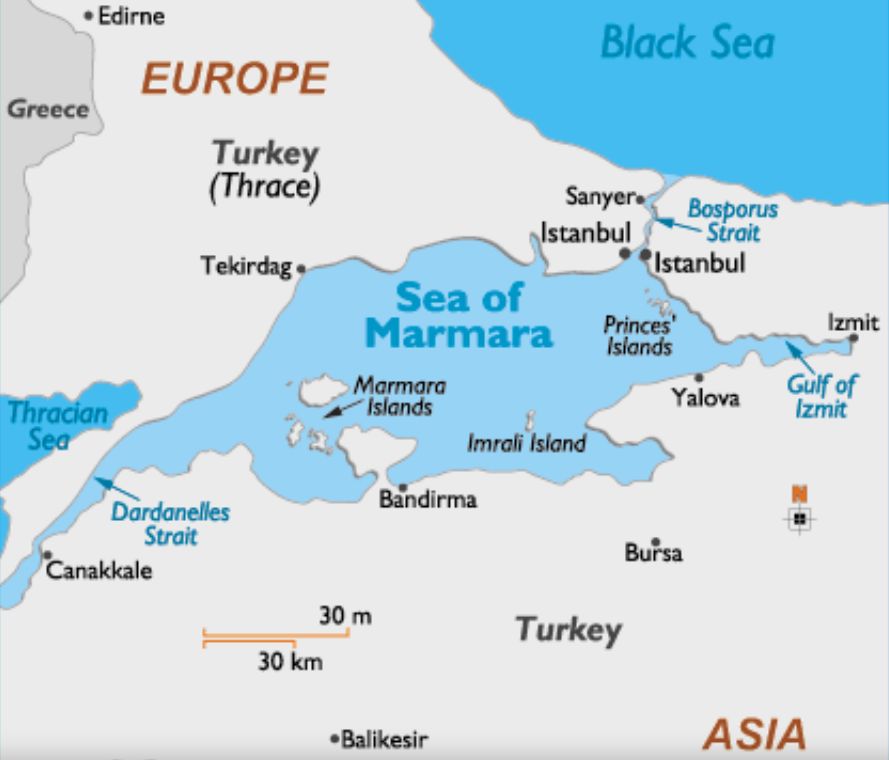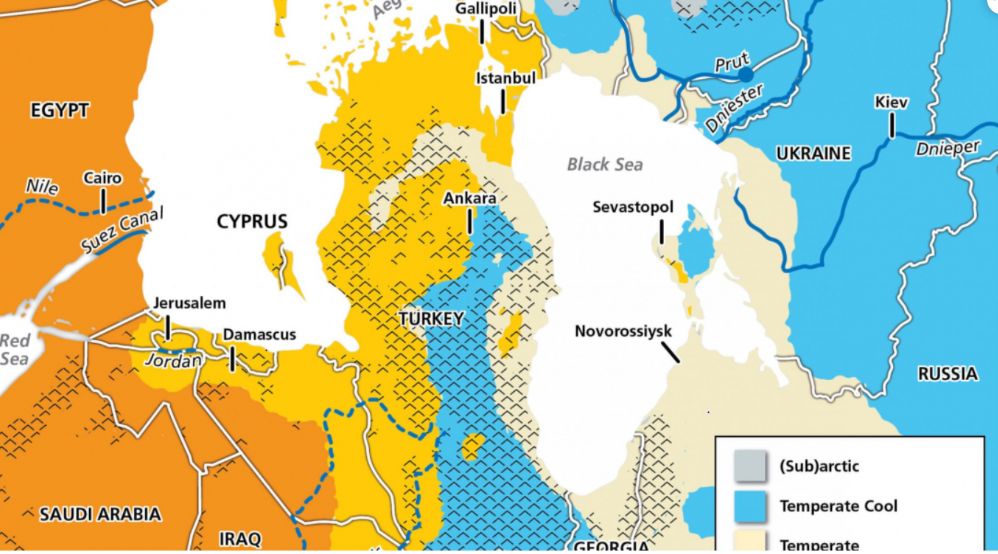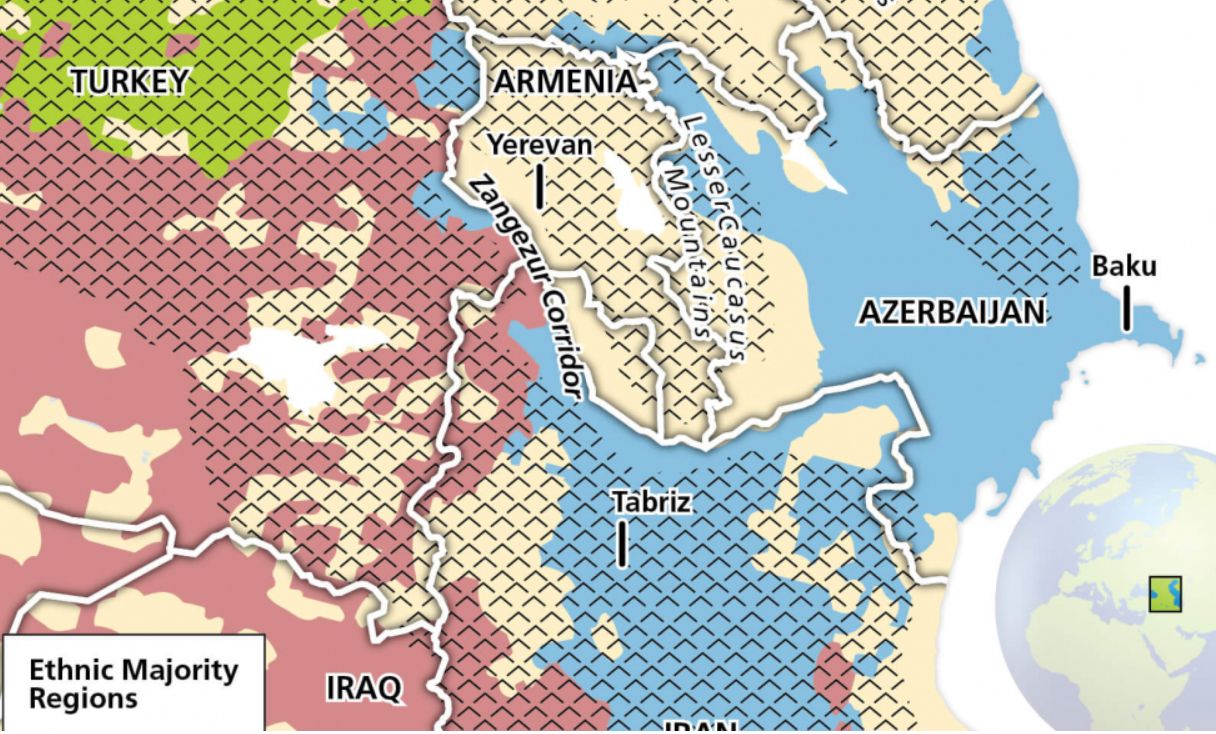By Eric Vandenbroeck
Turkey In Context
The Sea of Marmara
(/ˈmɑːrmərə/; Turkish: Marmara Denizi;
Greek: Θάλασσα του Μαρμαρά, Ancient Greek: Προποντίς, Προποντίδα), also known as the Sea of Marmora or the Marmara
Sea, and in the context of classical antiquity as the Propontis, is the inland
sea, entirely within the borders of Turkey, that connects the Black Sea to the
Aegean Sea, thus separating Turkey's Asian and European parts. The Sea of
Marmara, a northeastern extension of the Mediterranean Sea, separates Asian
Turkey from European Turkey (Trace), thus it separates the two continents.

It contains two
island groups; the Marmara in the southwest and the
Princes' in the northeast. On the small island of Imrali
stands a maximum-security prison that holds just a few prisoners, including
Abdullah Ocalan, the leader of PKK, considered a Kurdish terrorist group.

A condition of the post–World War I settlement forced
Marmara and the Turkish Straits open to international traffic. Not only had
land-based global trade between Asia and Europe evaporated because of the
better logistics of deep water transport but now the
Turks couldn’t even charge duties on the regional trade passing through the
Bosporus and Dardanelles, even though all that trade sailed through downtown
Istanbul.

The Soviet rise in
the 1920s and domination of Central Europe at the end of the Second World War
next not only completely locked the Turks out of what once had been some of
their richest territories, but also out of what once had been lucrative markets
of the Black Sea littoral. The Danube, Dniester, Dnieper, Don, and Volga
systems were now all internal waterways of the newly risen Soviet Empire, and
Soviet ideology frowned on trading with outsiders.
Next, the creation of Israel and the subsequent Arab-Israeli standoff ended nearly all trade within, much
less through, the final economically interesting bit of the former Ottoman
Empire: the Levant.
But the most damning
was the Americans’ new Order. In dismantling the empires and making the oceans
safe for everyone, the Americans extinguished any hope of the Turks’ geography
mattering at all to global trade. The Americans forced all the world’s waterways
to be part of the global commons.
If goods can go from
any port to any other port without needing to be concerned about either safety
on the high seas or persnickety local naval powers, then the specific location.
Traders certainly didn’t need a central land-based clearinghouse. What had made
the Turks special, critical, evaporated. Marmara was still nice, and it ensured
the Turks remained the most powerful people in their (suddenly much smaller)
neighborhood, but no longer was it a kernel of an empire.
Today, many,
particularly Europeans, see the Turkish economy is substandard compared with
Northern European norms, with a far heavier emphasis on lower-skilled
industries like textiles and basic manufacturing.
However Turkey(while) may have
(strong) European tendencies and influences, but it isn’t part of the Northern
European Plain. Any comparisons must evaluate Turkey within its neighborhood:
the Black Sea Basin, the Eastern Balkans, the Western Mediterranean, and the
Middle East. In that neighborhood Turkey, isolated, insular, insular, is
already the regional power.
Turkey’s physical
location makes it the obvious connection point for such land-based transport
between Europe and the Middle East, and with roads and rail lines snaking in
all directions, with the Cold War’s end and the reopening of the former Soviet
space, trade from Europe, the Balkans, the Caucasus, and the Hordelands is once again flowing to Turkish ports, into
Marmara and beyond to the Mediterranean. Even in the unfortunate circumstance
that Turkey ends up crossing swords with the Russians, there will be far more
trade on the Black and through Marmara than there ever was under the Order.
Without American-enforced freedom of the seas, the Turks can return the
Bosporus and Dardanelles to their normal status of being internal waterways.
Everyone will have to pay the Turks to sail through.

Turkey the Middle East and the Balkans
The Middle East is
replete with examples of two local powers rising simultaneously, clashing, and
containing each other’s ambitions and opportunities to the point that they
massively weaken each other. Then a third power comes in and sweeps the board.
Saudi Arabia and Iran both fancy themselves regional powers. As the Turks have
far more military and economic capacity than the pair combined, the Turks find
the Saudi-Iranian battle for influence rather
adorable.
The Turks however
also reserve the option of interfering in the Saudi-Iranian
fight and settling it however they choose. The real fireworks of the Iranian-Saudi confrontation potentially could happen in
densely populated Mesopotamia, corresponding to today's Iraq, mostly, but also
parts of modern-day Iran, Syria, and Turkey.
The Soviet rise
barred commerce and contact with former imperial possessions to the northwest,
north, and northeast. The hostile, arid geography of the Middle East combined
with the rise of mutually hostile and/or totalitarian governments that cared
little about economic development or trade walled off the south. The only
“open” border the Turks had was with Iran, the
adjoining territories being physically rugged and far removed from the two
countries’ capital regions, both in terms of distance and culture.
For the Turks, the
brightest spot in this emerging world is the Eastern Balkans. The reasons are
legion.
The Americans
destroyed most of the Danubian bridges in Serbia
during the Kosovo War. The Eastern Balkan pair is not as integrated into Europe
now, a decade after EU and NATO membership, as closer countries, like Poland,
Latvia, and Hungary, were before EU and NATO membership.
Bulgaria and
Romania’s relative poverty compared with the rest of Europe enables the
Bulgarians and Romanians to switch partners with relative ease.*
Because the Turkish Straits are the best maritime connection between them and
the wider world, there’s not much wiggle room in choosing a post-Order. Both
Bulgaria and Romania are significant agricultural exporters, and between the
two and Turkey, nearly every climate zone that generates foodstuffs is
represented.
Above all else, the
Bulgarians and Romanians will be willing. Both Sofia and Bucharest realize that
their chances for charting their own destiny, even if the two allied, are zero.
The Balkan and Carpathian Mountains box them in, the Russians dominate their
northeast, the Turks their southeast, the Germans they're northwest, and any
access to the wider world requires the purposeful and ongoing permission of
multiple other powers. They are quintessential examples of the sort of
countries that have no long-term hope of survival
outside of the global management structures of the Order.
That is, they have no
chance without a sponsor. On their own, they are prey but partner them with the
Turks, and their position shifts from pathetic to enviable. They gain entrée to
a country with energy security, a market twice the size of their own combined,
and access to the Mediterranean Basin, something otherwise impossible. Defense
guarantees from Turkey may not have the gold-star value of those from the
United States, but the Turkish military is both competent and close by. Best be
on its good side.
While I mentioned Japans potential problem is
China Turkey's potential problem is (and has historically been) Russia.
Russia’s competition with
Europe will end meaningful oil and natural gas exports via the Baltic Sea and
North European Plain. The only other large-scale route is southwest via the
Black Sea and Turkish Straits. Even a minor military conflict with Turkey would
utterly end Russia’s ability to export oil and natural gas to the west,
removing it from the list of significant energy exporters (it currently ranks
number one for combined oil, natural gas, and petroleum products, with oil and
natural gas sales being the government’s top two sources of income).
The optimal time for
Turkish potential action would be once the Russians become fully committed
against the Northern Europeans. At that point the Russians would have fewer
forces to spare to a front in the south, vastly improving the success rate of
what would have to be a sizable amphibious assault.
The optimal place
would be the Crimean Peninsula, Turkish control of which would eliminate the
only meaningful Russian naval presence on the Black Sea, turning it into a
Turkish lake. Because the Crimea’s link to mainland Ukraine is only three miles
wide, defending it from a mainland assault would be easy. While Turkey’s air
force couldn’t hold its own against Russia in a one-on-one fight, Russian
forces would already be engaged against every country that borders the Baltic
Sea. It wouldn’t take much Turkish strike capacity to sever most of the Russian
army’s supply lines into western Ukraine and even Belarus. And the Turks would
have local help: the Crimea’s Ukrainian and Tatar minorities would likely view
the Turks as liberators from Russian occupation.

Russia already has
thousands of airmen and soldiers in not just the Crimea, but also Armenia and
in secessionist regions in Georgia. Turkish intrusion into the Crimea or
Azerbaijan would so change the facts on the ground that the Russians would feel
they have no choice but to use every tool at their disposal, from prompting a
Kurdish insurrection in eastern Turkey to a sponsoring an Armenian assault into
Georgia to bombing Istanbul itself. High reward brings high risk.
The Syrian problem
Pre-Order interior
“Syria” was a caravan route throughout lightly populated terrain, dotted with a
quartet of ancient oasis cities, Aleppo, Homs, Hama, and Damascus. But the
Order’s freeing of the global ocean combined with its shattering of the empires
ended the caravan trade while erecting hard political borders. The people of
Syria could no longer trade for food; they had to find something else.
The Syrian Civil War,
first and foremost, is a civilizational collapse with its roots in national
starvation. Which is damnably inconvenient for a newly emergent Turkey. Even if
the Syrian Civil War ended today, there isn’t enough water and oil to feed the
population. Syria will not, will never, recover.
Rivers of Syrian
refugees into Turkey are the new normal, for they’ve nowhere else to flow. The
Saudi and Iraqi borders are hard desert. That leaves Turkey.
Iran and the Azeris
Because the Azeris are Iran’s largest minority group, extra effort
has gone into grinding as much of the Turk out of the Azerbaijanis as possible.
While most Iranian Azeris certainly still consider themselves of Turkic
descent, that is not the same as saying they consider themselves anti-Persian
or fully Turkish. For example, the dominant religion among Iranian Azeris is
Shia Islam, the same as the Persians, and not the Sunni Islam practiced in
Turkey. The Turks will certainly enjoy the support of a large fifth column in
any invasion, but they will not be categorically welcomed.

Iran has tools beyond
its military. Iranian intelligence assets at any given
time are active in Azerbaijan, Afghanistan, Iraq, Saudi Arabia, Jordan, Syria,
Lebanon, the Palestinian Territories, . . . and Turkey. In times of Turkish-Iranian hostility, Iran has worked overtime to stoke
tensions and militancy among Turkey’s many mountain minorities and political
factions, most notably the Kurdish population. And because any Turkish assault
on Iran would need to pass through Turkey’s own Kurdish region, Iran would
undoubtedly work to set that entire region on fire. Even if Turkey could seize
northwestern Iran, holding on to it would be a whole other problem.
This whole scenario
seems like more trouble than it’s worth, but it is worth considering, for two
reasons.
First, most of
Turkey’s border regions have interlocking issues. Going into Romania can lead
to confrontation with Russia, which can lead to intervention in Ukraine, which
naturally leads to competition in Azerbaijan, which means Turkish forces in Zangezur, which means Tabriz is in play. Whoever has
controlled Marmara, their top problem has always been the spiraling combination
of seemingly unrelated topics and theaters into a royal, untangleable
mess.
Economically, the
Balkan advance makes the most sense. Ethnically, it is difficult to argue
against grabbing the Azerbaijans. Going southeast
solves both an internal security issue as well as an energy dependency. Taking Cyprus would be a strategic coup and give the
Turks leverage against all of Europe. Grabbing Crimea would condemn the Turks’
most powerful historical foe to dissolution. What is clear is that Turkey has
options, and that includes options for the fights it will pick.
Options make the
foreign policy of contemporary Turkey seem erratic. Within the past decade, the
Turks have offered Armenia peace and threatened it with invasion, funded some
infrastructure in (independent) Azerbaijan while also haranguing Baku on other projects,
cozied up to Russia economically but shot down a Russian jet, alternately let
Syrian migrants flow through its territories to Europe and stopped them,
encouraged Islamic militants to flow into Syria and then invaded Syria to kill
them, encouraged Iraqi Kurds to ship their oil through Turkish territory while
invading Iraqi Kurdistan, and competed with the Iranians for influence in
Azerbaijan and Iraq while also helping the Iranians with US sanctions.
This said the
Europeans and Russians wouldn’t like the Turks moving into the Eastern Balkans.
The Russians and Iranians wouldn’t like the Turks moving into the Caucasus. The
Iranians obviously wouldn’t be keen on the Turks moving into Iranian
Azerbaijan, while neither the Iranians nor the Saudis would like to see Turkish
troops moving into Iraq at all. Turkish forces there would be able to cut off
any Iranian assault on Saudi Arabia in a day, while the last thing the Saudis
want to see on their northern border is a functional state and military.
If Turkey is forced
to deploy a hundred thousand troops or so to stabilize Syria, it will largely
occupy Turkish strategic attention for years, absorbing any military bandwidth
that might have been used to venture in to Greece or
Romania or Crimea or Azerbaijan or Iran. It would also enable Russia, Iran, and
Saudi Arabia to pin Turkey down more firmly by spawning violence in the
occupied areas.
Turkey will always be
smack dab in the middle of everything. It’s relationships with outside powers may wax and wane, but
it will always be the economic and military heavyweight of its region.
For updates click homepage here